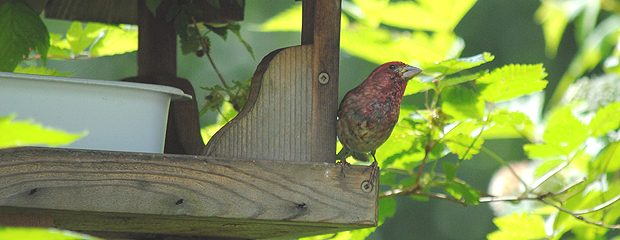Beware of creating an environment at bird feeders that will be deadly for birds, instead of helpful. The importance of keeping backyard feeders clean is highlighted by this article from last winter – Salmonella outbreak sickens pine siskins
Winter is a harsh time of year for wildlife, and many people wish to help by offering food to help them through the lean time. But we may be killing these birds with kindness.
Outbreaks of salmonellosis, a bacterial disease, are a common cause of death in birds at birdfeeders, especially pine siskins.
Warren Wartig (MARS president) has this to say, “A reminder to all backyard birders to make sure your feeders are kept clean. Don’t let fungus, mold and bacteria (e.g., Salmonella) collect in the bottom of your feeder. Clean them out regularly with a bottle brush, soap and water, and a splash of bleach to kill off the bacteria. Rinse well and air dry.” According to Warren, the fats in suet are resistant to fungus and bacteria, so suet balls or bars are preferable during the winter, when the risk of these hazards is highest. The fat in suet also provides more energy to birds for resisting low winter temperatures.
There are different strains of the disease, which may be carried by many different types of animals, including rodents. The bacteria live in the intestines and are passed through the feces.
The organism can be spread from bird to bird through direct contact or ingestion of food or water contaminated from an infected bird or mammal. Carriers may appear healthy but can shed the organism periodically in their droppings.
In order to reduce the spread of the disease, clean feeders with 10% bleach in water solution, rinse well and dry. Avoid putting feeders up for a few weeks, and change their locations regularly. Rake up waste feed and droppings below feeders. Add more feeders to reduce crowding. Store birdseed in rodent proof containers.
No medical treatment is known to completely cure birds infected by this organism. Some medications may temporarily heal the bird but it may persist in the host and spread to other uninfected birds at a later time. This disease may also cause illness in people. Minimize this risk by following a few common sense steps such as wearing rubber gloves when handling carcasses or dropping, washing hands in warm, soapy water, clean feeders outside and not in the kitchen sink, discourage pets from eating dead birds, and dispose of any carcasses by putting them in plastic bags in the garbage.
If there are more than five dead birds found at any one time, report them to the Ministry of Environment or to Mountainaire Avian Rescue Society’s (MARS’) toll-free pager at 1-(800)-304-9968. MARS is a volunteer-based registered charity. All donations help the society to care for wildlife on northern Vancouver Island and a tax receipt will be issued.

